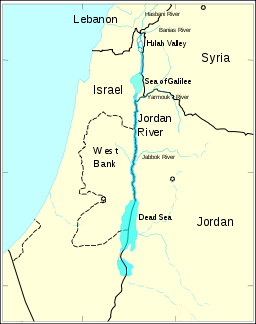Freshwater is one of the most vital resources in the modern world. This resource is valued even higher in the mostly arid Middle East region. When common water resources have to be shared among different nations in the region, the existing political differences result in tension and disputes over water management.
River Jordan is one trans-boundary watercourse that is heavily influenced by the politics of the nations utilizing its waters. The five independent parties that share the Jordan River Basin are Israel, Palestine, Jordan, Lebanon, and Syria.

In spite of the significance of this common water supply to the various parties, political hostilities prevent adequate cooperation. Zeitoun, Tathami and Eid-Sabbagh declare that tensions over trans-boundary water are complex and conflicts may exist for protracted periods (299). The Jordan River’s basin is negatively affected by the political situation between the various states.
Due to widespread diversion of water, the river’s volume has greatly decreased and some parts have no flow. The total quantity reaching the Dead Sea is minimal and this has led to a sharp annual decline in the volume of the Sea (Mirumachi and Zeitoun 306). In addition to this, the river is badly polluted by industrial waste from the riparians. Hostilities between the participating states make it impossible to establish a body that can manage the river basin resources.
The conflict over River Jordan’s water is caused by the desire for each party to control the resources. Currently, Israel is the apparent hegemonic state. Israel’s power comes from its occupation of the Syrian Golan Heights and its control over Palestinian territory’s water resources. This creates tension between Israel and Palestine over the control of water in the Palestinian Territories (Yetim 88).
Tension also exists over Israel’s occupation and control of Syria’s water resources. There are conflicts between Jordan and Syria due to Syria’s attempts to build canals to divert water from the river. Finally, tensions exist between Israel and Lebanon over Lebanon’s attempts to build a dam that would be fed by the Jordan River. Such an act by Lebanon would affect the Jordan’s volume since the river originates from this country.
Two nations that have a special interest in the Jordan River are Jordan and Israel. These two states rely primarily on the Jordan River Basin for their water needs making the river critical to their survival. Cooperation in the management and utilization of the water resources was crucial to the survival of the two nations. By the early 1990s, it was recognized that a treaty to share and govern the Jordan River’s waters between Jordan and Israel was crucial to the survival of both parties.
To address the water issues between them, Israel and Jordan included some water clauses in the 1993 Peace Treaty. Mirumachi and Zeitoun confirm that the two countries were initially unwilling to exploit international agreements to establish water cooperation between themselves (303). However, the influence of a hegemonic state outside the watercourse, namely the US, led to the establishment of some cooperation between Jordan and Israel.
In recent years, the deteriorating state of the river has led to some elements of cooperation among the parties. The importance of the Jordan has led to cooperation between Israel, Palestine and Jordan to promote the protection of the river. In spite of the political differences among the parties, trans-boundary cooperation has occurred in the campaigns aimed sustaining the flow of the important river. Zeitoun et al. note that elements of cooperation and conflict co-exist among the nations that obtain water from the Jordan (300).
The paper has shown that trans-boundary watercourses create the potential for conflict over distribution, co-management and utilization. The political conflicts prevalent in the Middle East make equitable water cooperation hard to achieve. This had had a devastating effect on the Jordan River Basin and its future sustainability is in question. Steps should be taken to promote real cooperation between the Jordan River Basin’s riparians thereby ensuring the future wellbeing of the river.
Works Cited
Mirumachi, Naho and Mark Zeitoun “Transboundary water interaction I: reconsidering conflict and cooperation.” Int Environ Agreements 8.1 (2008): 297-316.
Yetim, Erref. “Governing International Rivers of the Middle East.” World Affairs 166.2(2003): 81-94.
Zeitoun, Mark, Michael Tathami and Karim Eid-Sabbagh. “The Influence of Narratives on Negotiations and Resolution of the Upper Jordan River Conflict.” International Negotiation 18.2 (2013): 293-322.